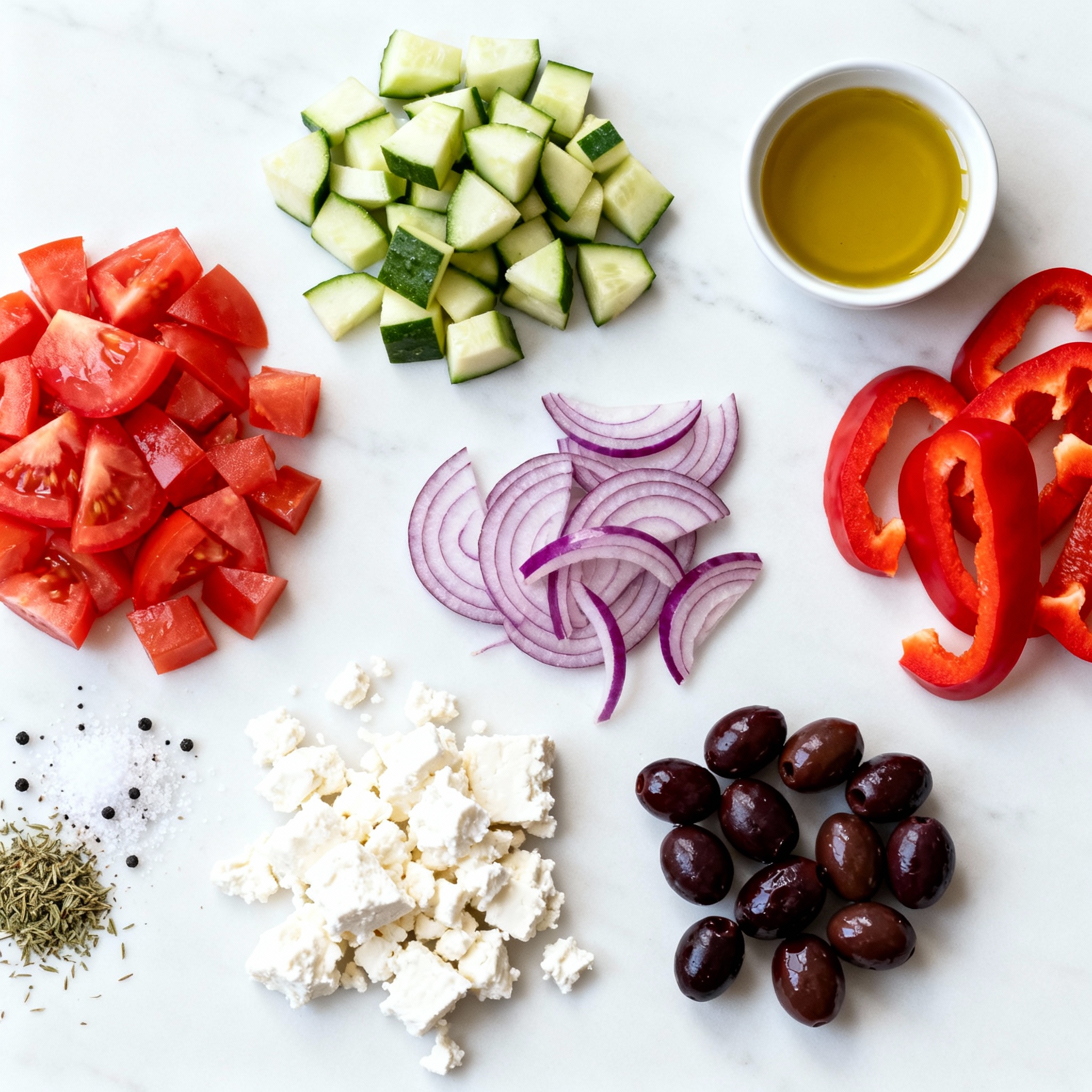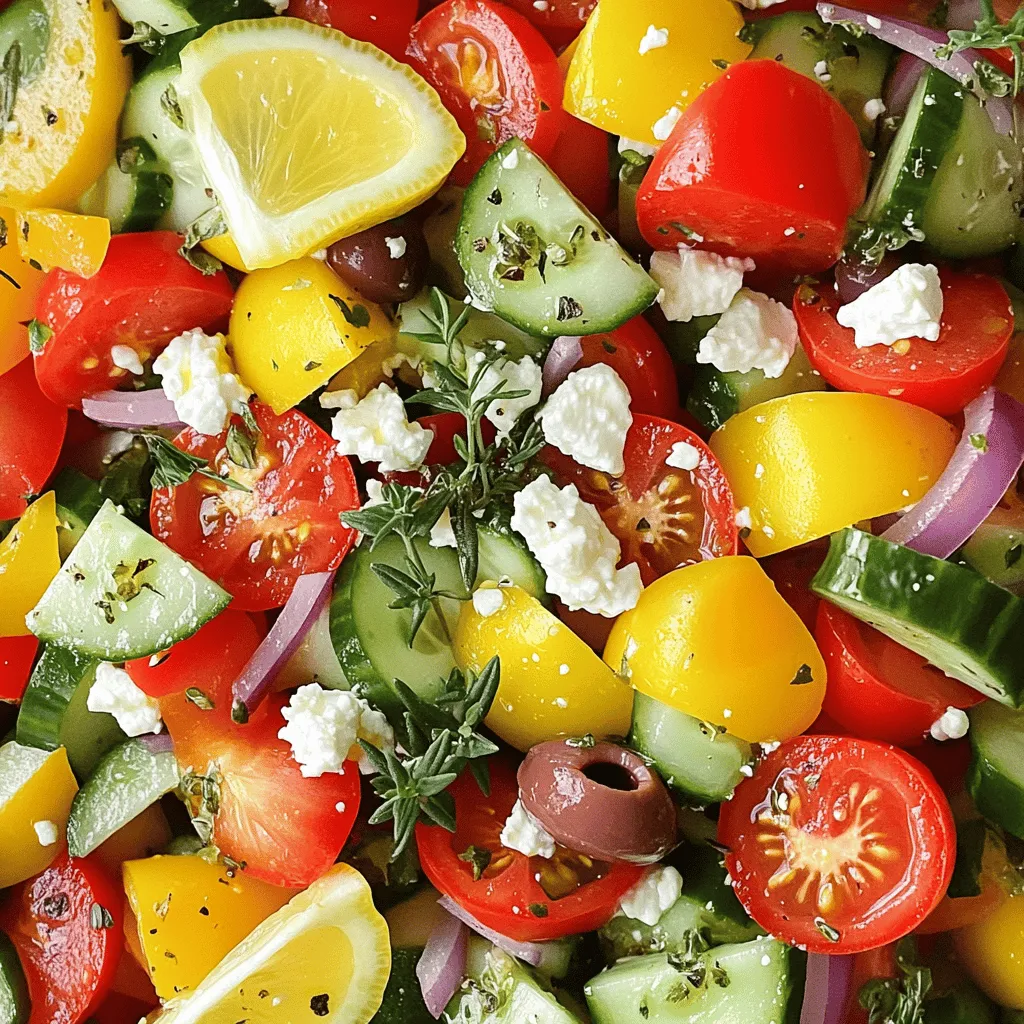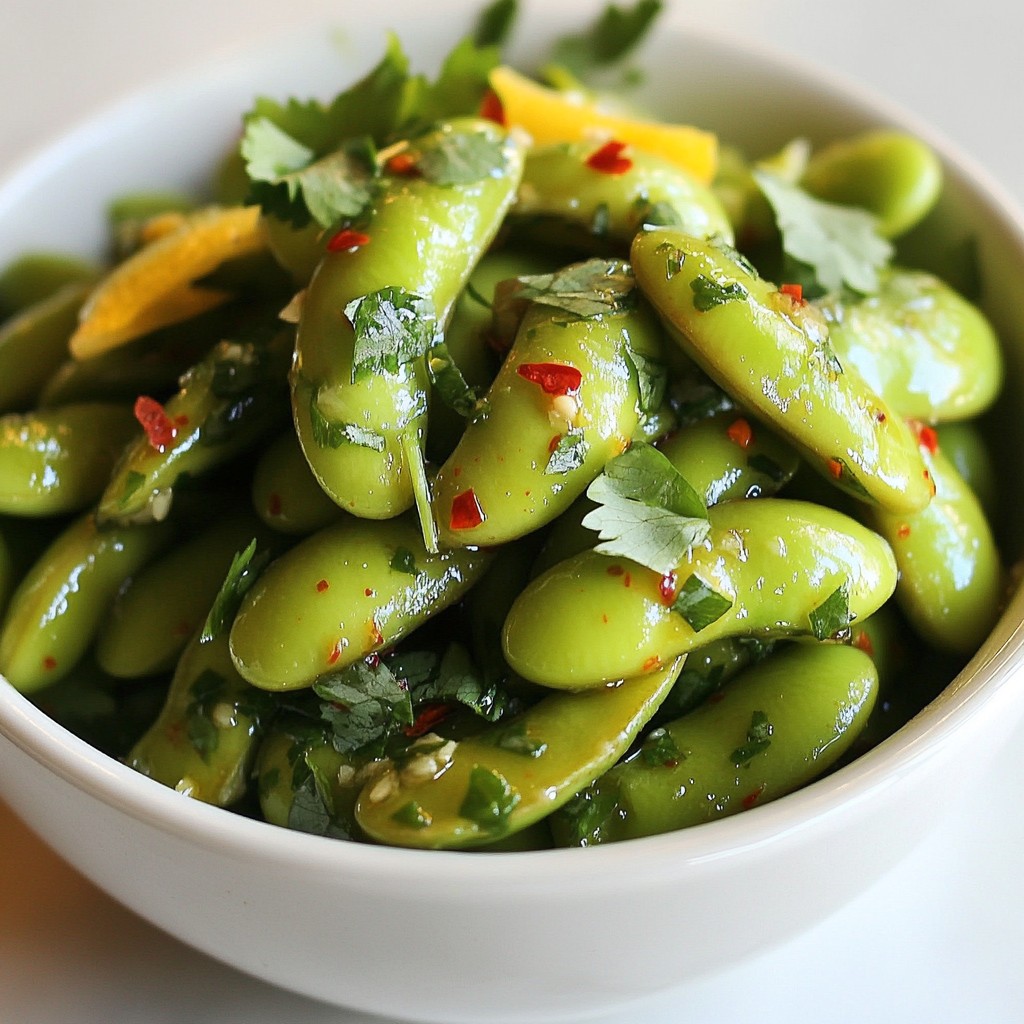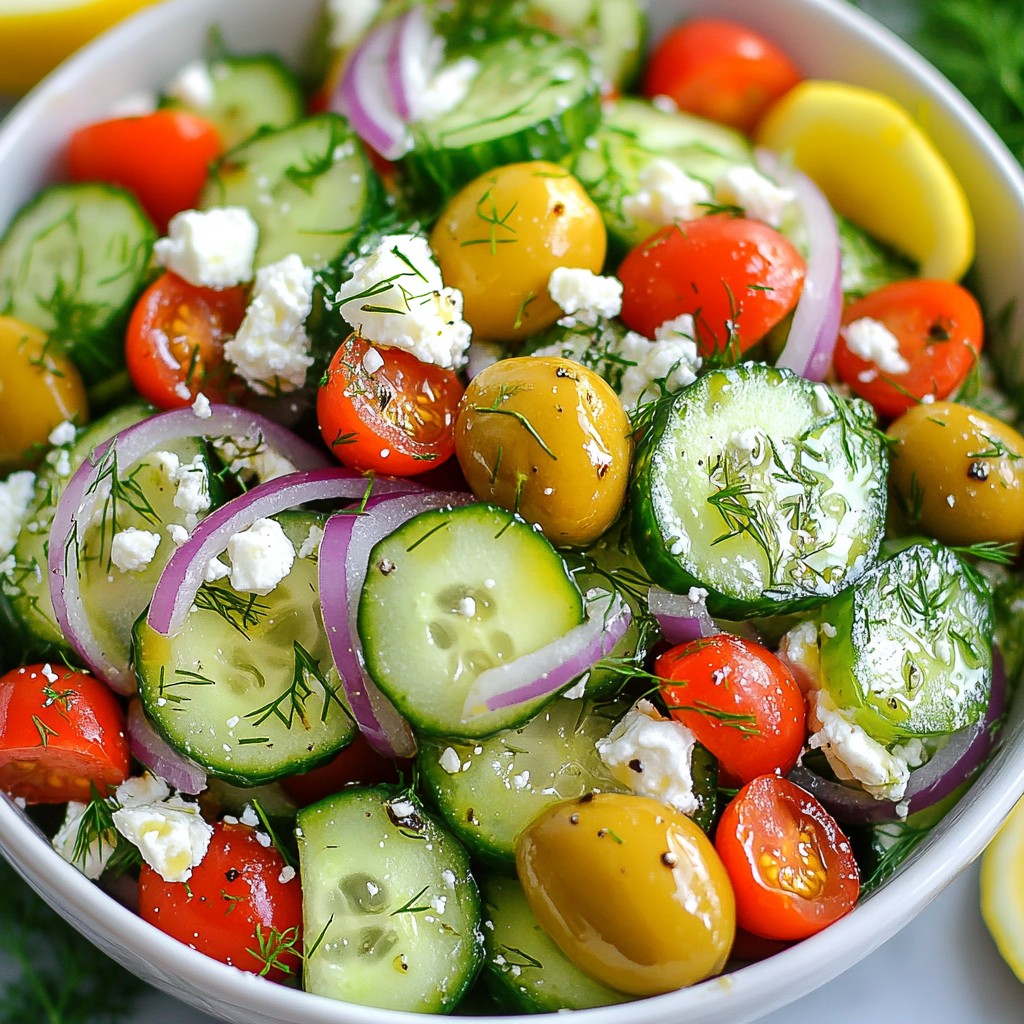Are you ready to dive into a bowl of pure freshness? A Classic Greek Salad is not just a dish; it’s a delightful celebration of vibrant ingredients. Bursting with ripe tomatoes, crisp cucumbers, and rich feta, this salad is a healthful option that’s easy to prepare. Join me as I share the simple steps, tips, and tasty variations to make your Greek salad unforgettable!
Why I Love This Recipe
- Fresh Ingredients: This salad showcases the vibrant flavors of fresh, seasonal vegetables, making it a perfect choice for summer dining.
- Quick and Easy: With minimal prep time, this recipe allows you to whip up a delicious dish in just 15 minutes, perfect for busy weeknights.
- Healthy and Nutritious: Packed with vitamins, minerals, and healthy fats, this salad is a wholesome option that supports a balanced diet.
- Versatile: This Greek salad can be served as a side or a main dish, and it pairs well with various proteins and breads, making it adaptable for any meal.
Ingredients
Fresh Vegetables
– 3 cups ripe tomatoes, chopped
– 1 cucumber, diced
– 1 bell pepper (red or yellow), sliced
– 1 small red onion, thinly sliced
Feta and Olives
– 1 cup Kalamata olives, pitted
– 1 cup feta cheese, crumbled
Flavorful Dressing
– 1/4 cup extra virgin olive oil
– 2 tablespoons red wine vinegar (optional)
– 1 teaspoon dried oregano
– Salt and black pepper to taste
The ingredients in a classic Greek salad are simple but fresh. You want bright colors and crisp flavors. The ripe tomatoes give sweetness. The cucumber adds a nice crunch. The bell pepper brings a bit of sweetness, too. A thin slice of red onion adds a sharp taste.
Kalamata olives are a must. They add a briny flavor that balances the salad. Crumbled feta cheese gives it creaminess. This mix makes each bite delightful.
The dressing is quick to make. Extra virgin olive oil gives richness. Red wine vinegar adds a tangy touch, but it’s optional. Dried oregano is key; it brings a warm, earthy note. Salt and pepper round out the flavors perfectly.

Step-by-Step Instructions
Preparation of Vegetables
Start by getting a large mixing bowl. Combine the chopped tomatoes, diced cucumber, sliced bell pepper, and thinly sliced red onion in this bowl. The mix of colors from these fresh veggies makes the salad look great. It also adds a burst of flavor with each bite. Use ripe tomatoes for juiciness and a crisp cucumber for crunch. This base is key to a tasty Greek salad.
Adding Feta and Olives
Next, incorporate the Kalamata olives and crumbled feta cheese into the bowl. The olives give a salty punch, while feta adds creaminess. You can use more or less feta, based on your taste. I love how these ingredients blend together. They bring a taste of Greece right to your kitchen.
Preparing the Dressing
For the dressing, take a small bowl and whisk together the extra virgin olive oil, red wine vinegar (if using), dried oregano, salt, and black pepper. This dressing is simple but full of flavor. Olive oil adds richness, while vinegar brings a slight tang. The oregano adds that classic Greek taste. Mix this well until it is smooth.
Final Mixing and Serving
Now, pour the dressing over the salad. Toss everything gently to combine. Make sure all the ingredients get coated with the dressing. I usually let the salad sit for about 10-15 minutes. This waiting time lets the flavors meld together nicely. Serve this vibrant salad in a large bowl or on individual plates. It looks beautiful and tastes even better!
Pro Tips
- Use Fresh Ingredients: Opt for the ripest tomatoes and freshest vegetables to enhance the flavor of your salad.
- Chill Before Serving: Refrigerate the salad for at least 30 minutes before serving to allow the flavors to develop and the salad to be refreshingly cold.
- Customize Your Cheese: If you prefer a milder flavor, try using goat cheese or a light ricotta instead of feta.
- Experiment with Add-Ins: Add ingredients like avocado, artichokes, or even grilled chicken for a heartier meal.
Tips & Tricks
Best Practices for Fresh Ingredients
Using fresh and seasonal produce makes a big difference. I recommend visiting a local market for the best tomatoes, cucumbers, and peppers. Look for firm tomatoes, crisp cucumbers, and bright peppers. These ingredients add flavor and crunch to your Greek salad.
Enhancing Flavor
Allowing the salad to sit for a bit helps the flavors meld. After mixing your ingredients, let them rest for 10-15 minutes. This time allows the dressing to soak into the veggies and cheese. You will taste the difference in each bite.
Presentation Tips
Serving your salad on a large platter is eye-catching. Garnish with fresh oregano sprigs and lemon wedges. This adds a pop of color and a zesty aroma. A beautiful presentation makes your meal more inviting and enjoyable.
Variations
Adding Proteins
You can make your Greek salad heartier by adding proteins. Grilled chicken is a great choice. Simply season it with salt, pepper, and a bit of oregano before grilling. Slice it and place it on top of your salad for added flavor and texture. Another tasty option is shrimp. Grill or sauté the shrimp until they turn pink. Add them to the salad for a seafood twist. Both options boost the protein content, making the salad more filling.
Different Cheese Options
While feta cheese is the classic choice, you can try other cheeses too. Goat cheese adds a tangy flavor and creaminess that many enjoy. It crumbles easily and pairs well with fresh vegetables. If you want a lighter option, consider Greek yogurt. It adds creaminess and a slight tang without the fat of cheese. Just dollop some on top before serving. Each cheese brings its own unique taste, enhancing your salad experience.
Seasonal Variations
Greek salad can change with the seasons. In summer, add fresh zucchini or cucumbers for crunch. Thinly slice the zucchini and toss it in with the other veggies. In fall or spring, try adding radishes for a peppery kick. They add a nice crunch that contrasts with the softer ingredients. Using seasonal veggies not only enhances flavor but also supports local farmers and reduces your carbon footprint. Enjoy the freshness of each season in your salad!
Storage Info
Best Practices for Storing Leftovers
After enjoying your Classic Greek Salad, store any leftovers in an airtight container. This keeps the salad fresh longer. Place the container in the refrigerator right away. This helps to maintain the crispness of the vegetables.
Freshness Tips
For the best taste, consume your salad within 2-3 days. After this time, the veggies start to lose their crunch. The flavors may also dull, making it less enjoyable.
Preparation Ahead of Time
You can prep your ingredients in advance. Chop the vegetables and store them separately. However, add the dressing just before serving. This keeps everything fresh and vibrant. Your salad will taste much better this way!
FAQs
What makes a Greek salad traditional?
A traditional Greek salad includes fresh ingredients. The main parts are ripe tomatoes, cucumbers, bell peppers, red onions, Kalamata olives, and feta cheese. Each ingredient adds taste and texture. The salad uses olive oil and oregano for dressing. The mix of colors looks beautiful and brightens any table.
Can I make this salad vegan?
Yes, you can make this salad vegan easily. Just leave out the feta cheese. You can replace it with vegan cheese or avocado for creaminess. For the dressing, try using lemon juice and herbs instead of vinegar. This keeps the salad fresh and tasty while making it plant-based.
How can I make this salad more filling?
To make this salad more filling, add grains. Quinoa or couscous works well. Cook the grains according to package directions and mix them in. They add protein and fiber, making the salad a complete meal. You can also throw in some chickpeas for extra nutrition.
This Greek salad combines fresh veggies, feta, and olives for a tasty dish. You learned to prepare the salad in steps, from mixing veggies to making a flavorful dressing. Remember, fresh ingredients make all the difference. Enhancing flavors with time is key. You can add proteins for extra nutrition or try different cheeses based on your taste. Store leftovers well to keep them fresh. With these tips, you can create a refreshing and satisfying salad every time. Enjoy making this dish your own!

.png)


